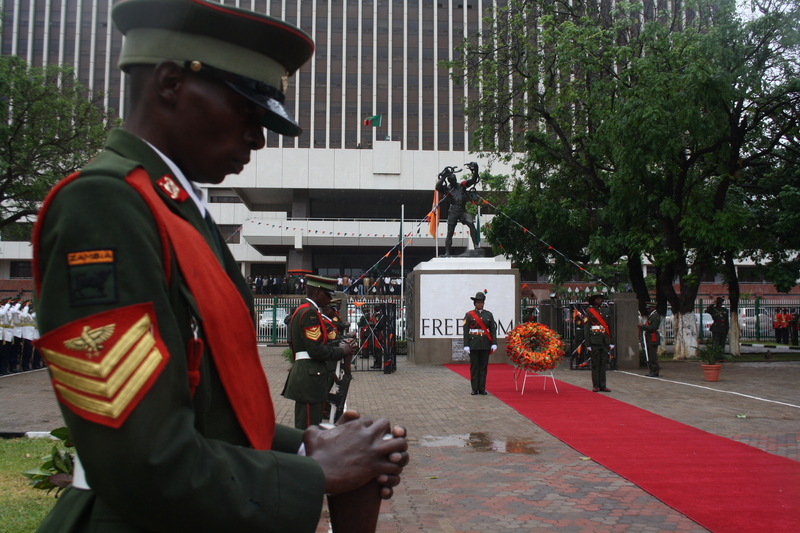
Zambia's National Freedom Day last year in Lusaka. October 24, 2013, photo by Owen Miyanza. Demotix.
Zambia celebrated its golden jubilee last week, on October 24. This year's anniversary marked the first time in 50 years of independence that Zambia's sitting head of state was absent at the festivities, as President Michael Sata was abroad for what his staff called a “medical check up.”
While Zambians all over the world celebrated the holiday with food, the national colours, and anything else they could lay their hands on, some observations have raised serious questions about the country's past and future.
The most high-profile criticism came from the opposition: United Party for National Development (UPND) leader Hakainde Hichilema called on people to wear black to commemorate and not celebrate the occasion:
What did the freedom fighters envisage this country will be 50 years down the road? Is it what it is today? Since the PF came to power on a platform of lies and deceit the country has witnessed repression, the country has witnessed violation of fundamental human rights, freedoms and liberties, bias public media coverage, police brutality, political violence of unprecedented levels I never thought I would live post 1991 to see a country that has so much political violence.
Some Zambian social media users didn't agree with Hichilema, who spent the day comforting the bereaved and distributing bags of corn meal and cooking oil, but it was Canicius Banda, one of UPND's two vice presidents, who attracted the most attention on Zambia's golden jubilee with a question posed on Facebook. Banda challenged the public to think harder about the holiday, asking if independence day celebrates the mere passage of time, or the country's achievements since that hot summer night 50 years ago, when Northern Rhodesia transformed itself into the Republic of Zambia. He wrote:
ON ZAMBIA'S GOLDEN JUBILEE [The Case of Merely Rejoicing Over the Passage of Time and NOT Achievement/The Calendar Parties]: Vernon Mwaanga, one of Zambia's own freedom fighters and political authorities, in his book, The Long Sunset, observes as follows: ‘…the colonialists left more than 40 years ago and in the case of many African countries we can no longer blame them for our woes. Slavery belongs to our painful past. Now we must transform our countries and move towards modernity, correcting our past mistakes, but moving forward all the time…’ The Republican Vice President Dr Guy Scott, fifty years post-independence, only one week ago, commenting on the 2015 National Budget said this: ‘Our priorities as a nation are wrong. Instead of fighting unemployment we are focusing on single-digit inflation; meanwhile citizens in the Lukanga swamps are surviving on [eating] scorpions. This is not right.’ Mr Alexander Chikwanda, Minister of Finance, a few weeks ago stated as follows: ‘We have failed to progress in this country because of leadership failure.’ Mr Chikwanda is spot on with his diagnosis. As we start another 50 years, we need a new breed of youthful, patriotic, nationalistic, knowledgeable, wise and God-fearing leaders. This is our prayer. Lord hear us! And we are sure that He will answer our prayer. These ‘Belinda Times’, times of deception must surely end!
Michael Chishala, in a contribution to the online news website Zambian Watchdog, wrote:
After 50 years of self-rule, it is shameful that our economic statistics are equivalent to war-torn countries, some of which are now doing better than us in many areas. Every Zambian government has blamed something other than themselves for the mess we are in. They are elected to bring change but they fail, while we the citizens are not putting enough pressure on them. It is time we the new generation make a change.
Chishala then posed some ways forward for Zambia:
I believe there has to be a change of ideas and attitudes. Zambians should firstly realize that they should take their vote seriously and not be swept off their feet by smooth talking politicians. They should adopt a skeptical disposition and thoroughly question prospective candidates … Civil Society, the Church, political parties and all of us must press for a drastic reduction in the powers of the Executive, arguably the greatest single problem.
In a joint pastoral letter on Independence Day Eve, Zambia's three “mother” body churches—the Zambia Episcopal Conference, Christian Council of Zambia, and Evangelical Fellowship of Zambia—stressed the need for poverty reduction as a top priority:
The challenge though still remains for Zambia to put in place better redistributive policies so that the majority poor and the most vulnerable in our society are not left to be mere spectators in the current economic activities. In other words, the country’s economic boom would only be meaningful if it significantly reduces poverty among the people of Zambia and allows the active participation of the majority citizenry. Unfortunately, what we see being achieved is the ever widening gap between the rich and the poor and marginalization of rural areas in terms of infrastructure development and economic activities.








1 comment